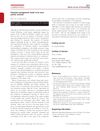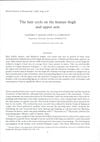 August 2010 in “Springer eBooks”
August 2010 in “Springer eBooks” Hormonal contraceptives are effective for teens but require careful consideration of side effects and individual health.
 16 citations,
November 2018 in “Singapore Medical Journal”
16 citations,
November 2018 in “Singapore Medical Journal” Primary care for PCOS focuses on lifestyle changes, medication based on symptoms, and mental health, with diabetes screening and specialist referral for severe cases.
 July 2016 in “British journal of dermatology/British journal of dermatology, Supplement”
July 2016 in “British journal of dermatology/British journal of dermatology, Supplement” Hirsutism treatment should focus more on patient needs and quality of life.
January 2014 in “Healthy aging research” Polycystic ovarian disease symptoms can continue after menopause, making diagnosis and management in older women challenging.
83 citations,
December 2012 in “International journal of endocrinology and metabolism/International journal of endocrinology and metabolism.” Oral contraceptives provide various health benefits beyond birth control, including managing menstrual issues, skin conditions, pain, and reducing the risk of certain cancers.
 926 citations,
June 2010 in “BMC Medicine”
926 citations,
June 2010 in “BMC Medicine” Polycystic ovary syndrome is a complex condition that affects women's mental, reproductive, and metabolic health throughout their lives.
 February 2020 in “Diabetologie Und Stoffwechsel”
February 2020 in “Diabetologie Und Stoffwechsel” The document concludes that more research is needed to include new treatments in guidelines for Polycystic Ovary Syndrome (PCOS).
 165 citations,
February 1994 in “Fertility and Sterility”
165 citations,
February 1994 in “Fertility and Sterility” Flutamide is more effective and has fewer side effects than spironolactone for treating hirsutism.
 195 citations,
November 2019 in “Clinica Chimica Acta”
195 citations,
November 2019 in “Clinica Chimica Acta” High levels of male hormones, insulin resistance, and obesity are closely linked and worsen polycystic ovary syndrome, but more research is needed to improve treatments.
33 citations,
April 2015 in “Cochrane library” Some medicines can reduce excessive hair growth in women, but more research is needed to compare treatments and consider side effects.
 42 citations,
July 2015 in “Journal of The American Academy of Dermatology”
42 citations,
July 2015 in “Journal of The American Academy of Dermatology” The conclusion is that oral contraceptives and antiandrogens can treat hirsutism and acne in women with cutaneous hyperandrogenism, but more research is needed for effective treatments, especially for hair loss.
January 2023 in “European journal of biology and medical science research” PCOS symptoms can be managed with medication and lifestyle changes.
 21 citations,
February 2017 in “International Journal of Women's Dermatology”
21 citations,
February 2017 in “International Journal of Women's Dermatology” Hormonal therapies help treat female hair loss, but results are slow and vary.
 January 2016 in “Springer eBooks”
January 2016 in “Springer eBooks” Hyperandrogenism, often causing excessive hair growth and acne, can be treated with methods like weight reduction, hair removal, various medications, and in the case of acne, topical treatments.
 28 citations,
November 2007 in “Medical Clinics of North America”
28 citations,
November 2007 in “Medical Clinics of North America” Obesity worsens Polycystic Ovary Syndrome symptoms, and weight loss is a key treatment.
58 citations,
July 1974 in “The Journal of clinical endocrinology and metabolism/Journal of clinical endocrinology & metabolism” Cyproterone acetate combined with ethinyl estradiol significantly reduced hirsutism in women.
19 citations,
March 2018 in “JAMA” Treat hirsutism in premenopausal women with oral contraceptives and consider additional treatments if needed.
 67 citations,
July 1985 in “British journal of dermatology/British journal of dermatology, Supplement”
67 citations,
July 1985 in “British journal of dermatology/British journal of dermatology, Supplement” Men's thigh hair grows longer and has a longer growth cycle than women's, but arm hair growth is similar between genders.
 37 citations,
February 2007 in “Clinical Obstetrics and Gynecology”
37 citations,
February 2007 in “Clinical Obstetrics and Gynecology” The document concludes that treating PCOS requires a combination of drugs to manage reproductive and metabolic symptoms, with more research needed on combination therapies.
 27 citations,
January 2013 in “Indian Journal of Dermatology, Venereology and Leprology”
27 citations,
January 2013 in “Indian Journal of Dermatology, Venereology and Leprology” PCOS is a complex disorder managed by treating symptoms and requires a team of specialists.
 4 citations,
March 2002 in “Journal of the American Pharmaceutical Association”
4 citations,
March 2002 in “Journal of the American Pharmaceutical Association” The conclusion is that pharmacists are important in helping women choose the right skin care treatments.
 22 citations,
August 2011 in “Endocrine Practice”
22 citations,
August 2011 in “Endocrine Practice” Most hirsutism cases are due to PCOS, and treatment focuses on lowering testosterone and blocking its effects.
 11 citations,
May 2003 in “Obstetrics and gynecology (New York. 1953. Online)/Obstetrics and gynecology”
11 citations,
May 2003 in “Obstetrics and gynecology (New York. 1953. Online)/Obstetrics and gynecology” Hirsutism in women often indicates a hormonal imbalance and can be managed with a combination of hormonal treatments and hair removal methods.
 54 citations,
August 2017 in “Gynecological Endocrinology”
54 citations,
August 2017 in “Gynecological Endocrinology” Lifestyle changes and weight loss are key for treating PCOS-related metabolic issues and infertility, with various medications available for specific symptoms.
 March 1988 in “Reactions (Auckland)”
March 1988 in “Reactions (Auckland)” Birth control pills can improve or cause acne and hair issues, with improvements more common, and may affect skin pigmentation.
 5 citations,
June 2018 in “Actas Dermo-Sifiliográficas”
5 citations,
June 2018 in “Actas Dermo-Sifiliográficas” In 2017, Spanish dermatologists commonly prescribed topical minoxidil, oral finasteride, and nutricosmetics for hair loss, with oral contraceptives also used for premenopausal women. Less common were oral dutasteride, due to side effects, and newer, more expensive treatments like topical finasteride and Low-Level Laser Therapy. The conclusion is that there's a need for prescription guidelines due to varied treatment approaches.
 54 citations,
September 2012 in “Dermatologic Clinics”
54 citations,
September 2012 in “Dermatologic Clinics” Some medications can cause hair loss, but stopping the drug usually leads to recovery within 3 months.
 3 citations,
January 2010 in “Expert Opinion on Pharmacotherapy”
3 citations,
January 2010 in “Expert Opinion on Pharmacotherapy” No treatment fully stops excessive hair growth in women, but various methods can help manage it effectively.
 96 citations,
September 2008 in “Seminars in Cutaneous Medicine and Surgery”
96 citations,
September 2008 in “Seminars in Cutaneous Medicine and Surgery” Hormonal treatments, including birth control and antiandrogens, can effectively treat acne in women.
 17 citations,
March 2006 in “Journal of Cosmetic Dermatology”
17 citations,
March 2006 in “Journal of Cosmetic Dermatology” Hormonal changes during and after pregnancy can cause hair growth changes and hair loss, with treatments available for some conditions.
























